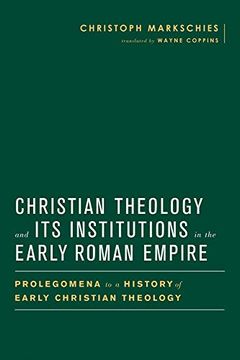Compartir
Christian Theology and its Institutions in the Early Roman Empire: Prolegomena to a History of Early Christian Theology (Baylor-Mohr Siebeck Studies in Early Christianity) (en Inglés)
Christoph Markschies (Autor)
·
Baylor University Press
· Tapa Dura
Christian Theology and its Institutions in the Early Roman Empire: Prolegomena to a History of Early Christian Theology (Baylor-Mohr Siebeck Studies in Early Christianity) (en Inglés) - Christoph Markschies
S/ 432,93
S/ 865,86
Ahorras: S/ 432,93
Elige la lista en la que quieres agregar tu producto o crea una nueva lista
✓ Producto agregado correctamente a la lista de deseos.
Ir a Mis Listas
Origen: España
(Costos de importación incluídos en el precio)
Se enviará desde nuestra bodega entre el
Miércoles 12 de Junio y el
Lunes 24 de Junio.
Lo recibirás en cualquier lugar de Perú entre 2 y 5 días hábiles luego del envío.
Reseña del libro "Christian Theology and its Institutions in the Early Roman Empire: Prolegomena to a History of Early Christian Theology (Baylor-Mohr Siebeck Studies in Early Christianity) (en Inglés)"
Tension between unity and diversity plagues any attempt to recount the development of earliest Christianity. Explanations run the gamutafrom asserting the presence of a fully formed and accepted unity at the beginning of Christianity to the hypothesis that understands orthodox unity as a later imposition upon Christianity by Rome. In Christian Theology and Its Institutions in the Early Roman Empire , Christoph Markschies seeks to unravel the complex problem of unity and diversity by carefully examining the institutional settings for the development of Christian theology. Specifically, Markschies contends that theological diversity is closely bound up with institutional diversity. Markschies clears the ground by tracing how previous studies fail to appreciate the critical role that diverse Christian institutions played in creating and establishing the very theological ideas that later came to define them. He next examines three distinct forms of institutional lifeathe Christian institutions of (higher) learning, prophecy, and worshipaand their respective contributions to Christianity's development. Markschies then focuses his attention on the development of the New Testament canon, demonstrating how different institutions developed their own respective "canons," while challenging views that assign a decisive role to Athanasius, Marcion, or the Gnostics. Markschies concludes by arguing that the complementary model of the "identity" and "plurality" of early Christianity is better equipped to address the question of unity and diversity than Walter Bauer's cultural Protestant model of "orthodoxy and heresy" or the Jesuit model of the "inculturation" of Christianity.
- 0% (0)
- 0% (0)
- 0% (0)
- 0% (0)
- 0% (0)
Todos los libros de nuestro catálogo son Originales.
El libro está escrito en Inglés.
La encuadernación de esta edición es Tapa Dura.
✓ Producto agregado correctamente al carro, Ir a Pagar.

